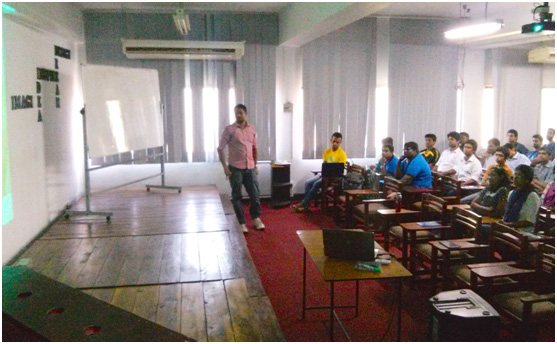Friday 23rd June was the day for students from Moratuwa University’s Faculty of Computer Science & Engineering to meet representatives from Sri Lanka’s leading Software Companies. Students anticipating their Industrial Internship – a compulsory six-month stint in the third academic year, working for a reputed software company – get this opportunity every year, to “meet the companies” that may hire them, and ask them questions about the experience they might have if they got selected as an Intern.
Eranjan Punchihewa (Senior Software Engineer), Ruwan Rajapakse (Head of Professional Services), Dilshan Amadoru (Senior Software Engineer) and myself (Technical Manager) represented Calcey at this event. We presented our company profile to the students, and showcased a brief example of the sort of technical challenge we often face in our projects in this case we explained how we had to build a JavaScript to Native iOS bridge, to invoke native iOS functions such as sending an email, whilst using an HTML5 app on an iPad.
There weren’t many questions during the presentation itself, but students came up and spoke to us after the session, and declared interest in working as Interns for our company. We were very pleased with their response, and look forward to delivering on our commitment to the Moratuwa CSE Internship program in the coming months.
Interns at Calcey will:
- Learn in some depth the use of at least one programming language, such as Objective-C, Python, Java or C#
- Put the engineering concepts we study in a school like design patterns into practical use
- Use at least two popular development frameworks that bring architectural patterns and best practices to language implementation, such as Cocoa Touch, Android, Django or ASP.NET MVC or suchlike
- Gain a thorough experience in a collaborative software development environment, configured for source control, dependency management and continuous integration
- Gain experience working together with others to build stuff, through Scrum methodology and intelligent, commonsense negotiation
- Participate in code reviews and receive critical feedback about the quality of one’s designs and code
- Participate in software design sessions and understand how to persist data across different platforms and environments
- Meet and speak to US/EU-based clients (if the opportunity arises)
I also encourage other private campuses that haven’t adopted this Industrial Internship strategy to consider it as an experience that enriches the academic advancement and career prospects of their student population. Knowing about software engineering concepts in an academic setting is one thing, being able to relate to these concepts in a practical sense is another…
